Faculty of Computing: Sustainable Construction Portfolio, BNV 7086
VerifiedAdded on 2019/09/30
|6
|1991
|125
Project
AI Summary
This coursework assignment is a portfolio focusing on sustainable construction, designed for the BNV 7086 module at the Faculty of Computing, Engineering, and the Built Environment. The assessment requires students to submit a portfolio comprising three summaries (each 1,000 words) of different sustainable construction topics, drawing on examples from practice and offering recommendations for action. Additionally, a synthesis piece (1,000 words) based on a case study is required, demonstrating how three sustainable construction topics were considered and incorporated into a building/construction project. One of these topics must be different from those covered in the summaries. The portfolio should address the role of a construction project manager in relation to sustainability. The total word count for the portfolio should not exceed 4,000 words, and it is assessed based on criteria including understanding of climate change and sustainability, evaluation of sustainable solutions, analysis of the project manager's role, and critical analysis of design principles. The assignment aims to assess students' ability to apply sustainable construction principles and critically evaluate their application in real-world scenarios. The deadline for submission is in November 2017, and electronic submission via Moodle is required.
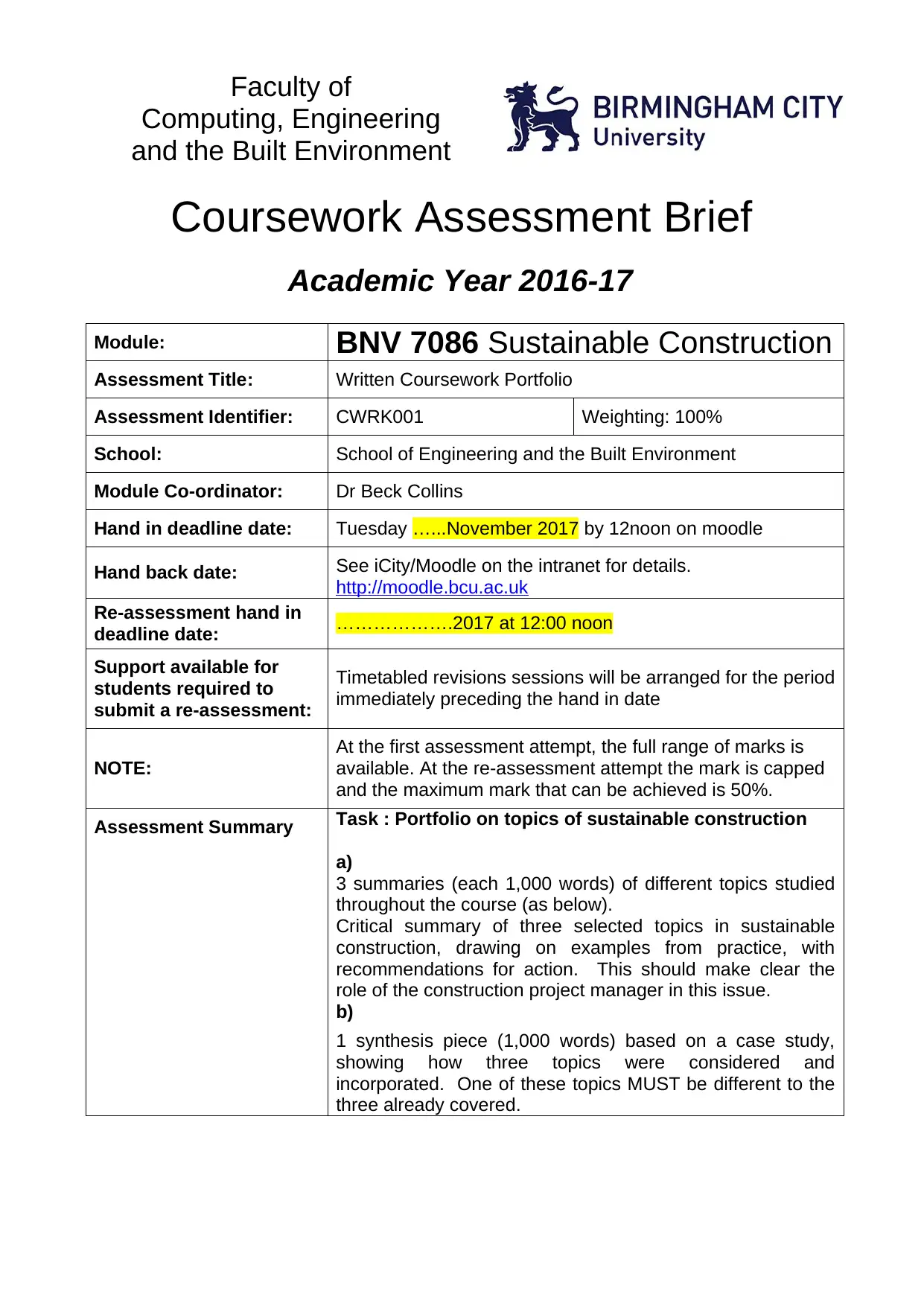
Faculty of
Computing, Engineering
and the Built Environment
Coursework Assessment Brief
Academic Year 2016-17
Module: BNV 7086 Sustainable Construction
Assessment Title: Written Coursework Portfolio
Assessment Identifier: CWRK001 Weighting: 100%
School: School of Engineering and the Built Environment
Module Co-ordinator: Dr Beck Collins
Hand in deadline date: Tuesday …...November 2017 by 12noon on moodle
Hand back date: See iCity/Moodle on the intranet for details.
http://moodle.bcu.ac.uk
Re-assessment hand in
deadline date: ……………….2017 at 12:00 noon
Support available for
students required to
submit a re-assessment:
Timetabled revisions sessions will be arranged for the period
immediately preceding the hand in date
NOTE:
At the first assessment attempt, the full range of marks is
available. At the re-assessment attempt the mark is capped
and the maximum mark that can be achieved is 50%.
Assessment Summary Task : Portfolio on topics of sustainable construction
a)
3 summaries (each 1,000 words) of different topics studied
throughout the course (as below).
Critical summary of three selected topics in sustainable
construction, drawing on examples from practice, with
recommendations for action. This should make clear the
role of the construction project manager in this issue.
b)
1 synthesis piece (1,000 words) based on a case study,
showing how three topics were considered and
incorporated. One of these topics MUST be different to the
three already covered.
Computing, Engineering
and the Built Environment
Coursework Assessment Brief
Academic Year 2016-17
Module: BNV 7086 Sustainable Construction
Assessment Title: Written Coursework Portfolio
Assessment Identifier: CWRK001 Weighting: 100%
School: School of Engineering and the Built Environment
Module Co-ordinator: Dr Beck Collins
Hand in deadline date: Tuesday …...November 2017 by 12noon on moodle
Hand back date: See iCity/Moodle on the intranet for details.
http://moodle.bcu.ac.uk
Re-assessment hand in
deadline date: ……………….2017 at 12:00 noon
Support available for
students required to
submit a re-assessment:
Timetabled revisions sessions will be arranged for the period
immediately preceding the hand in date
NOTE:
At the first assessment attempt, the full range of marks is
available. At the re-assessment attempt the mark is capped
and the maximum mark that can be achieved is 50%.
Assessment Summary Task : Portfolio on topics of sustainable construction
a)
3 summaries (each 1,000 words) of different topics studied
throughout the course (as below).
Critical summary of three selected topics in sustainable
construction, drawing on examples from practice, with
recommendations for action. This should make clear the
role of the construction project manager in this issue.
b)
1 synthesis piece (1,000 words) based on a case study,
showing how three topics were considered and
incorporated. One of these topics MUST be different to the
three already covered.
Paraphrase This Document
Need a fresh take? Get an instant paraphrase of this document with our AI Paraphraser
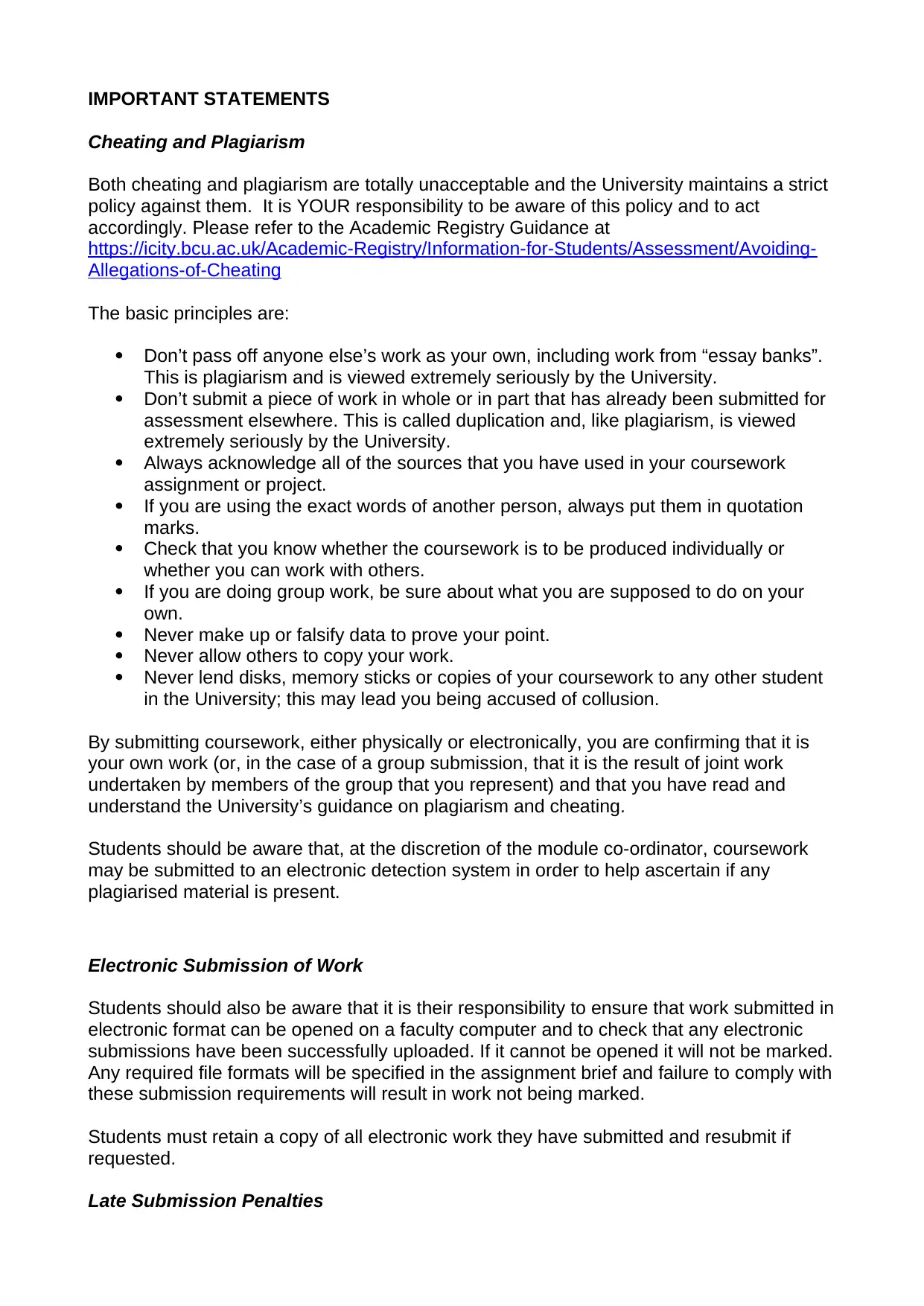
IMPORTANT STATEMENTS
Cheating and Plagiarism
Both cheating and plagiarism are totally unacceptable and the University maintains a strict
policy against them. It is YOUR responsibility to be aware of this policy and to act
accordingly. Please refer to the Academic Registry Guidance at
https://icity.bcu.ac.uk/Academic-Registry/Information-for-Students/Assessment/Avoiding-
Allegations-of-Cheating
The basic principles are:
Don’t pass off anyone else’s work as your own, including work from “essay banks”.
This is plagiarism and is viewed extremely seriously by the University.
Don’t submit a piece of work in whole or in part that has already been submitted for
assessment elsewhere. This is called duplication and, like plagiarism, is viewed
extremely seriously by the University.
Always acknowledge all of the sources that you have used in your coursework
assignment or project.
If you are using the exact words of another person, always put them in quotation
marks.
Check that you know whether the coursework is to be produced individually or
whether you can work with others.
If you are doing group work, be sure about what you are supposed to do on your
own.
Never make up or falsify data to prove your point.
Never allow others to copy your work.
Never lend disks, memory sticks or copies of your coursework to any other student
in the University; this may lead you being accused of collusion.
By submitting coursework, either physically or electronically, you are confirming that it is
your own work (or, in the case of a group submission, that it is the result of joint work
undertaken by members of the group that you represent) and that you have read and
understand the University’s guidance on plagiarism and cheating.
Students should be aware that, at the discretion of the module co-ordinator, coursework
may be submitted to an electronic detection system in order to help ascertain if any
plagiarised material is present.
Electronic Submission of Work
Students should also be aware that it is their responsibility to ensure that work submitted in
electronic format can be opened on a faculty computer and to check that any electronic
submissions have been successfully uploaded. If it cannot be opened it will not be marked.
Any required file formats will be specified in the assignment brief and failure to comply with
these submission requirements will result in work not being marked.
Students must retain a copy of all electronic work they have submitted and resubmit if
requested.
Late Submission Penalties
Cheating and Plagiarism
Both cheating and plagiarism are totally unacceptable and the University maintains a strict
policy against them. It is YOUR responsibility to be aware of this policy and to act
accordingly. Please refer to the Academic Registry Guidance at
https://icity.bcu.ac.uk/Academic-Registry/Information-for-Students/Assessment/Avoiding-
Allegations-of-Cheating
The basic principles are:
Don’t pass off anyone else’s work as your own, including work from “essay banks”.
This is plagiarism and is viewed extremely seriously by the University.
Don’t submit a piece of work in whole or in part that has already been submitted for
assessment elsewhere. This is called duplication and, like plagiarism, is viewed
extremely seriously by the University.
Always acknowledge all of the sources that you have used in your coursework
assignment or project.
If you are using the exact words of another person, always put them in quotation
marks.
Check that you know whether the coursework is to be produced individually or
whether you can work with others.
If you are doing group work, be sure about what you are supposed to do on your
own.
Never make up or falsify data to prove your point.
Never allow others to copy your work.
Never lend disks, memory sticks or copies of your coursework to any other student
in the University; this may lead you being accused of collusion.
By submitting coursework, either physically or electronically, you are confirming that it is
your own work (or, in the case of a group submission, that it is the result of joint work
undertaken by members of the group that you represent) and that you have read and
understand the University’s guidance on plagiarism and cheating.
Students should be aware that, at the discretion of the module co-ordinator, coursework
may be submitted to an electronic detection system in order to help ascertain if any
plagiarised material is present.
Electronic Submission of Work
Students should also be aware that it is their responsibility to ensure that work submitted in
electronic format can be opened on a faculty computer and to check that any electronic
submissions have been successfully uploaded. If it cannot be opened it will not be marked.
Any required file formats will be specified in the assignment brief and failure to comply with
these submission requirements will result in work not being marked.
Students must retain a copy of all electronic work they have submitted and resubmit if
requested.
Late Submission Penalties
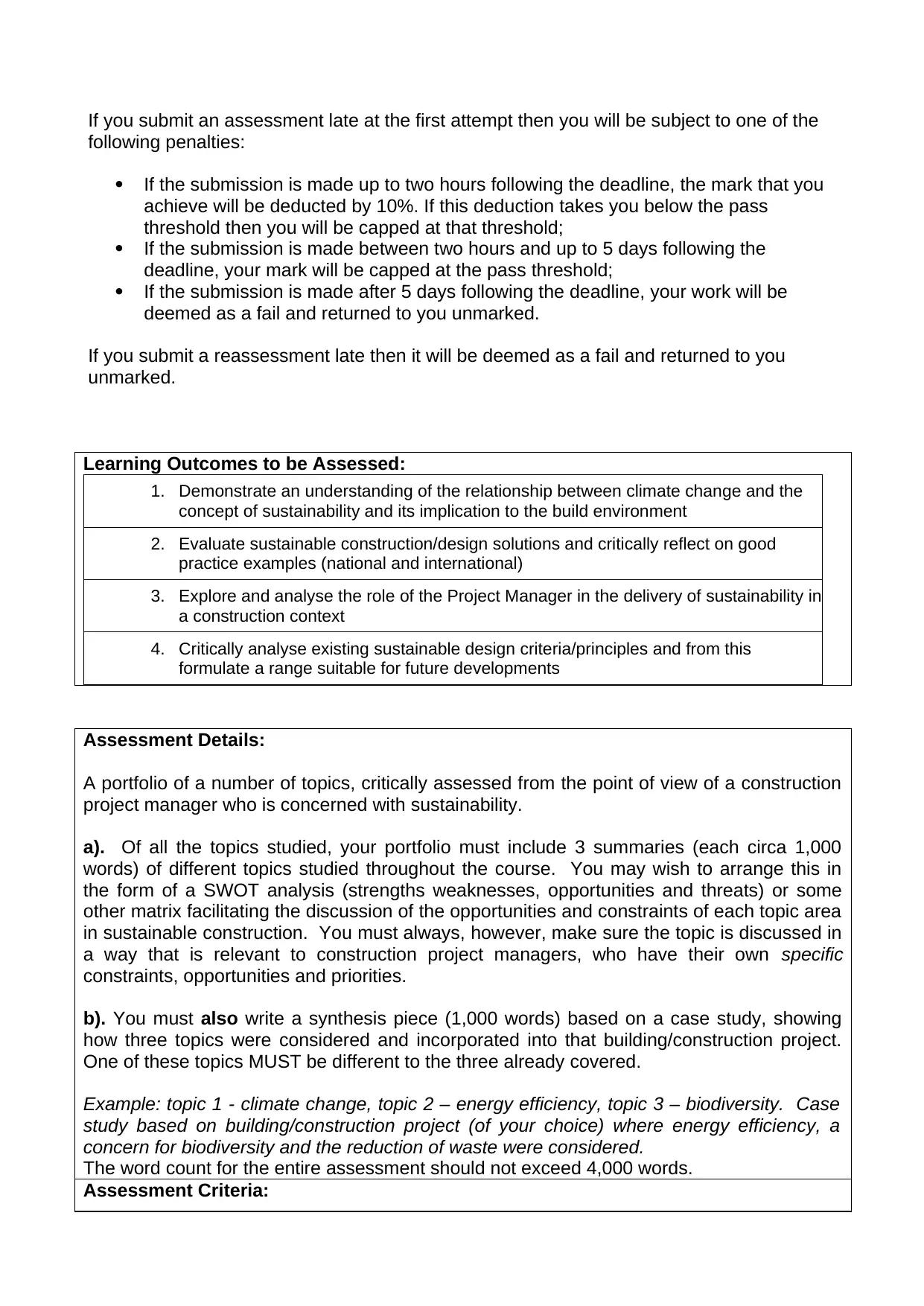
If you submit an assessment late at the first attempt then you will be subject to one of the
following penalties:
If the submission is made up to two hours following the deadline, the mark that you
achieve will be deducted by 10%. If this deduction takes you below the pass
threshold then you will be capped at that threshold;
If the submission is made between two hours and up to 5 days following the
deadline, your mark will be capped at the pass threshold;
If the submission is made after 5 days following the deadline, your work will be
deemed as a fail and returned to you unmarked.
If you submit a reassessment late then it will be deemed as a fail and returned to you
unmarked.
Learning Outcomes to be Assessed:
1. Demonstrate an understanding of the relationship between climate change and the
concept of sustainability and its implication to the build environment
2. Evaluate sustainable construction/design solutions and critically reflect on good
practice examples (national and international)
3. Explore and analyse the role of the Project Manager in the delivery of sustainability in
a construction context
4. Critically analyse existing sustainable design criteria/principles and from this
formulate a range suitable for future developments
Assessment Details:
A portfolio of a number of topics, critically assessed from the point of view of a construction
project manager who is concerned with sustainability.
a). Of all the topics studied, your portfolio must include 3 summaries (each circa 1,000
words) of different topics studied throughout the course. You may wish to arrange this in
the form of a SWOT analysis (strengths weaknesses, opportunities and threats) or some
other matrix facilitating the discussion of the opportunities and constraints of each topic area
in sustainable construction. You must always, however, make sure the topic is discussed in
a way that is relevant to construction project managers, who have their own specific
constraints, opportunities and priorities.
b). You must also write a synthesis piece (1,000 words) based on a case study, showing
how three topics were considered and incorporated into that building/construction project.
One of these topics MUST be different to the three already covered.
Example: topic 1 - climate change, topic 2 – energy efficiency, topic 3 – biodiversity. Case
study based on building/construction project (of your choice) where energy efficiency, a
concern for biodiversity and the reduction of waste were considered.
The word count for the entire assessment should not exceed 4,000 words.
Assessment Criteria:
following penalties:
If the submission is made up to two hours following the deadline, the mark that you
achieve will be deducted by 10%. If this deduction takes you below the pass
threshold then you will be capped at that threshold;
If the submission is made between two hours and up to 5 days following the
deadline, your mark will be capped at the pass threshold;
If the submission is made after 5 days following the deadline, your work will be
deemed as a fail and returned to you unmarked.
If you submit a reassessment late then it will be deemed as a fail and returned to you
unmarked.
Learning Outcomes to be Assessed:
1. Demonstrate an understanding of the relationship between climate change and the
concept of sustainability and its implication to the build environment
2. Evaluate sustainable construction/design solutions and critically reflect on good
practice examples (national and international)
3. Explore and analyse the role of the Project Manager in the delivery of sustainability in
a construction context
4. Critically analyse existing sustainable design criteria/principles and from this
formulate a range suitable for future developments
Assessment Details:
A portfolio of a number of topics, critically assessed from the point of view of a construction
project manager who is concerned with sustainability.
a). Of all the topics studied, your portfolio must include 3 summaries (each circa 1,000
words) of different topics studied throughout the course. You may wish to arrange this in
the form of a SWOT analysis (strengths weaknesses, opportunities and threats) or some
other matrix facilitating the discussion of the opportunities and constraints of each topic area
in sustainable construction. You must always, however, make sure the topic is discussed in
a way that is relevant to construction project managers, who have their own specific
constraints, opportunities and priorities.
b). You must also write a synthesis piece (1,000 words) based on a case study, showing
how three topics were considered and incorporated into that building/construction project.
One of these topics MUST be different to the three already covered.
Example: topic 1 - climate change, topic 2 – energy efficiency, topic 3 – biodiversity. Case
study based on building/construction project (of your choice) where energy efficiency, a
concern for biodiversity and the reduction of waste were considered.
The word count for the entire assessment should not exceed 4,000 words.
Assessment Criteria:
⊘ This is a preview!⊘
Do you want full access?
Subscribe today to unlock all pages.

Trusted by 1+ million students worldwide
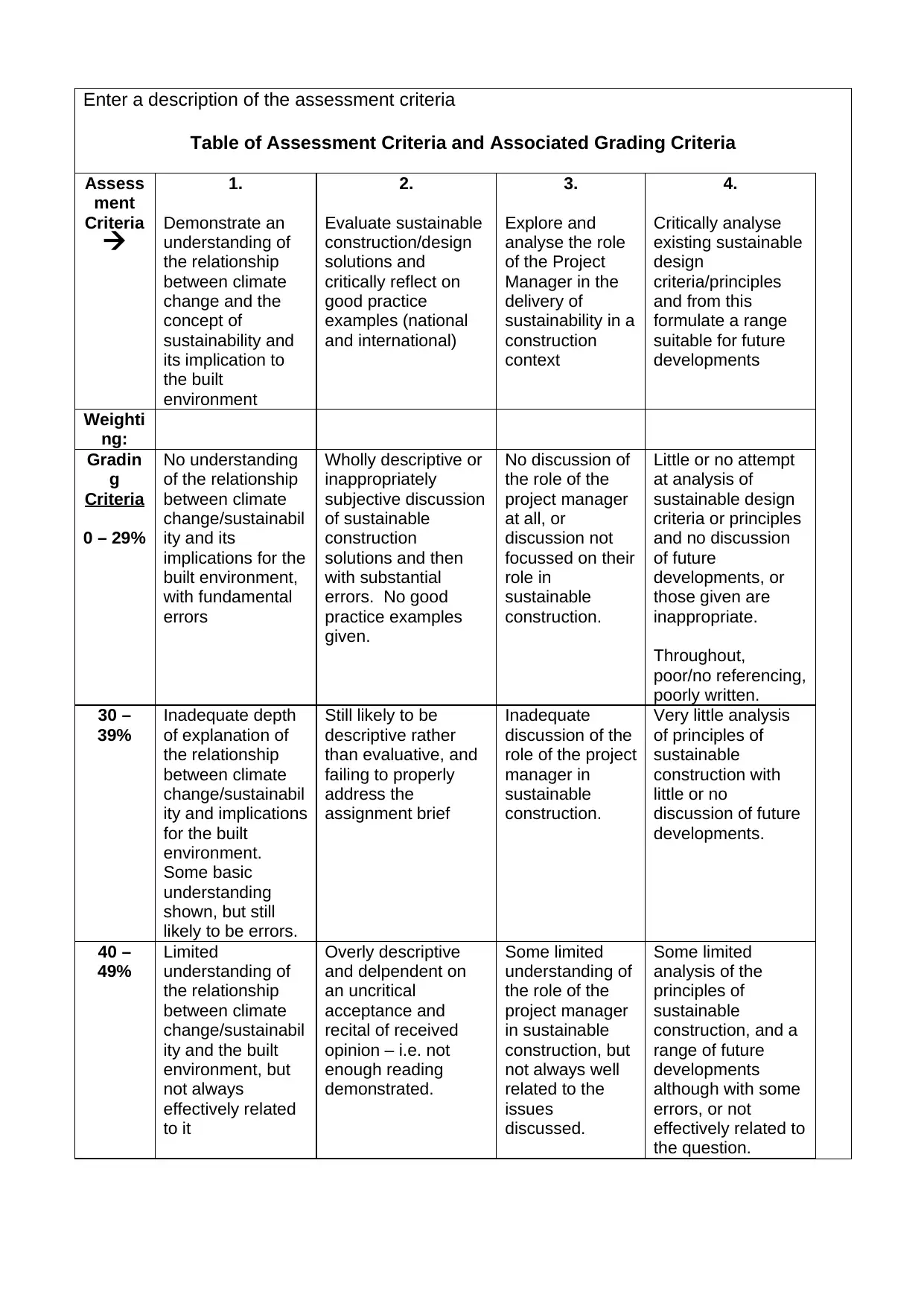
Enter a description of the assessment criteria
Table of Assessment Criteria and Associated Grading Criteria
Assess
ment
Criteria
1.
Demonstrate an
understanding of
the relationship
between climate
change and the
concept of
sustainability and
its implication to
the built
environment
2.
Evaluate sustainable
construction/design
solutions and
critically reflect on
good practice
examples (national
and international)
3.
Explore and
analyse the role
of the Project
Manager in the
delivery of
sustainability in a
construction
context
4.
Critically analyse
existing sustainable
design
criteria/principles
and from this
formulate a range
suitable for future
developments
Weighti
ng:
Gradin
g
Criteria
0 – 29%
No understanding
of the relationship
between climate
change/sustainabil
ity and its
implications for the
built environment,
with fundamental
errors
Wholly descriptive or
inappropriately
subjective discussion
of sustainable
construction
solutions and then
with substantial
errors. No good
practice examples
given.
No discussion of
the role of the
project manager
at all, or
discussion not
focussed on their
role in
sustainable
construction.
Little or no attempt
at analysis of
sustainable design
criteria or principles
and no discussion
of future
developments, or
those given are
inappropriate.
Throughout,
poor/no referencing,
poorly written.
30 –
39%
Inadequate depth
of explanation of
the relationship
between climate
change/sustainabil
ity and implications
for the built
environment.
Some basic
understanding
shown, but still
likely to be errors.
Still likely to be
descriptive rather
than evaluative, and
failing to properly
address the
assignment brief
Inadequate
discussion of the
role of the project
manager in
sustainable
construction.
Very little analysis
of principles of
sustainable
construction with
little or no
discussion of future
developments.
40 –
49%
Limited
understanding of
the relationship
between climate
change/sustainabil
ity and the built
environment, but
not always
effectively related
to it
Overly descriptive
and delpendent on
an uncritical
acceptance and
recital of received
opinion – i.e. not
enough reading
demonstrated.
Some limited
understanding of
the role of the
project manager
in sustainable
construction, but
not always well
related to the
issues
discussed.
Some limited
analysis of the
principles of
sustainable
construction, and a
range of future
developments
although with some
errors, or not
effectively related to
the question.
Table of Assessment Criteria and Associated Grading Criteria
Assess
ment
Criteria
1.
Demonstrate an
understanding of
the relationship
between climate
change and the
concept of
sustainability and
its implication to
the built
environment
2.
Evaluate sustainable
construction/design
solutions and
critically reflect on
good practice
examples (national
and international)
3.
Explore and
analyse the role
of the Project
Manager in the
delivery of
sustainability in a
construction
context
4.
Critically analyse
existing sustainable
design
criteria/principles
and from this
formulate a range
suitable for future
developments
Weighti
ng:
Gradin
g
Criteria
0 – 29%
No understanding
of the relationship
between climate
change/sustainabil
ity and its
implications for the
built environment,
with fundamental
errors
Wholly descriptive or
inappropriately
subjective discussion
of sustainable
construction
solutions and then
with substantial
errors. No good
practice examples
given.
No discussion of
the role of the
project manager
at all, or
discussion not
focussed on their
role in
sustainable
construction.
Little or no attempt
at analysis of
sustainable design
criteria or principles
and no discussion
of future
developments, or
those given are
inappropriate.
Throughout,
poor/no referencing,
poorly written.
30 –
39%
Inadequate depth
of explanation of
the relationship
between climate
change/sustainabil
ity and implications
for the built
environment.
Some basic
understanding
shown, but still
likely to be errors.
Still likely to be
descriptive rather
than evaluative, and
failing to properly
address the
assignment brief
Inadequate
discussion of the
role of the project
manager in
sustainable
construction.
Very little analysis
of principles of
sustainable
construction with
little or no
discussion of future
developments.
40 –
49%
Limited
understanding of
the relationship
between climate
change/sustainabil
ity and the built
environment, but
not always
effectively related
to it
Overly descriptive
and delpendent on
an uncritical
acceptance and
recital of received
opinion – i.e. not
enough reading
demonstrated.
Some limited
understanding of
the role of the
project manager
in sustainable
construction, but
not always well
related to the
issues
discussed.
Some limited
analysis of the
principles of
sustainable
construction, and a
range of future
developments
although with some
errors, or not
effectively related to
the question.
Paraphrase This Document
Need a fresh take? Get an instant paraphrase of this document with our AI Paraphraser
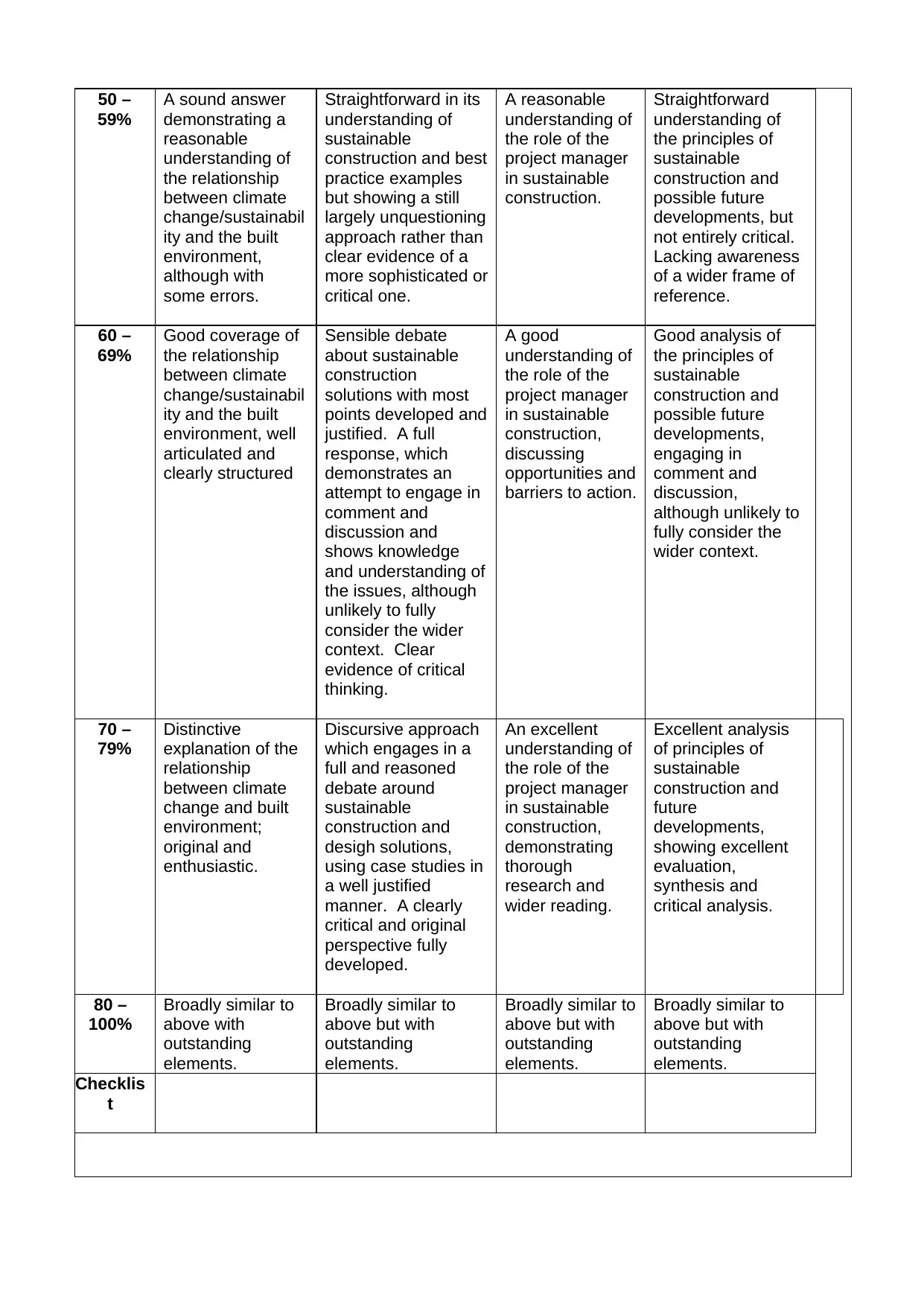
50 –
59%
A sound answer
demonstrating a
reasonable
understanding of
the relationship
between climate
change/sustainabil
ity and the built
environment,
although with
some errors.
Straightforward in its
understanding of
sustainable
construction and best
practice examples
but showing a still
largely unquestioning
approach rather than
clear evidence of a
more sophisticated or
critical one.
A reasonable
understanding of
the role of the
project manager
in sustainable
construction.
Straightforward
understanding of
the principles of
sustainable
construction and
possible future
developments, but
not entirely critical.
Lacking awareness
of a wider frame of
reference.
60 –
69%
Good coverage of
the relationship
between climate
change/sustainabil
ity and the built
environment, well
articulated and
clearly structured
Sensible debate
about sustainable
construction
solutions with most
points developed and
justified. A full
response, which
demonstrates an
attempt to engage in
comment and
discussion and
shows knowledge
and understanding of
the issues, although
unlikely to fully
consider the wider
context. Clear
evidence of critical
thinking.
A good
understanding of
the role of the
project manager
in sustainable
construction,
discussing
opportunities and
barriers to action.
Good analysis of
the principles of
sustainable
construction and
possible future
developments,
engaging in
comment and
discussion,
although unlikely to
fully consider the
wider context.
70 –
79%
Distinctive
explanation of the
relationship
between climate
change and built
environment;
original and
enthusiastic.
Discursive approach
which engages in a
full and reasoned
debate around
sustainable
construction and
desigh solutions,
using case studies in
a well justified
manner. A clearly
critical and original
perspective fully
developed.
An excellent
understanding of
the role of the
project manager
in sustainable
construction,
demonstrating
thorough
research and
wider reading.
Excellent analysis
of principles of
sustainable
construction and
future
developments,
showing excellent
evaluation,
synthesis and
critical analysis.
80 –
100%
Broadly similar to
above with
outstanding
elements.
Broadly similar to
above but with
outstanding
elements.
Broadly similar to
above but with
outstanding
elements.
Broadly similar to
above but with
outstanding
elements.
Checklis
t
59%
A sound answer
demonstrating a
reasonable
understanding of
the relationship
between climate
change/sustainabil
ity and the built
environment,
although with
some errors.
Straightforward in its
understanding of
sustainable
construction and best
practice examples
but showing a still
largely unquestioning
approach rather than
clear evidence of a
more sophisticated or
critical one.
A reasonable
understanding of
the role of the
project manager
in sustainable
construction.
Straightforward
understanding of
the principles of
sustainable
construction and
possible future
developments, but
not entirely critical.
Lacking awareness
of a wider frame of
reference.
60 –
69%
Good coverage of
the relationship
between climate
change/sustainabil
ity and the built
environment, well
articulated and
clearly structured
Sensible debate
about sustainable
construction
solutions with most
points developed and
justified. A full
response, which
demonstrates an
attempt to engage in
comment and
discussion and
shows knowledge
and understanding of
the issues, although
unlikely to fully
consider the wider
context. Clear
evidence of critical
thinking.
A good
understanding of
the role of the
project manager
in sustainable
construction,
discussing
opportunities and
barriers to action.
Good analysis of
the principles of
sustainable
construction and
possible future
developments,
engaging in
comment and
discussion,
although unlikely to
fully consider the
wider context.
70 –
79%
Distinctive
explanation of the
relationship
between climate
change and built
environment;
original and
enthusiastic.
Discursive approach
which engages in a
full and reasoned
debate around
sustainable
construction and
desigh solutions,
using case studies in
a well justified
manner. A clearly
critical and original
perspective fully
developed.
An excellent
understanding of
the role of the
project manager
in sustainable
construction,
demonstrating
thorough
research and
wider reading.
Excellent analysis
of principles of
sustainable
construction and
future
developments,
showing excellent
evaluation,
synthesis and
critical analysis.
80 –
100%
Broadly similar to
above with
outstanding
elements.
Broadly similar to
above but with
outstanding
elements.
Broadly similar to
above but with
outstanding
elements.
Broadly similar to
above but with
outstanding
elements.
Checklis
t
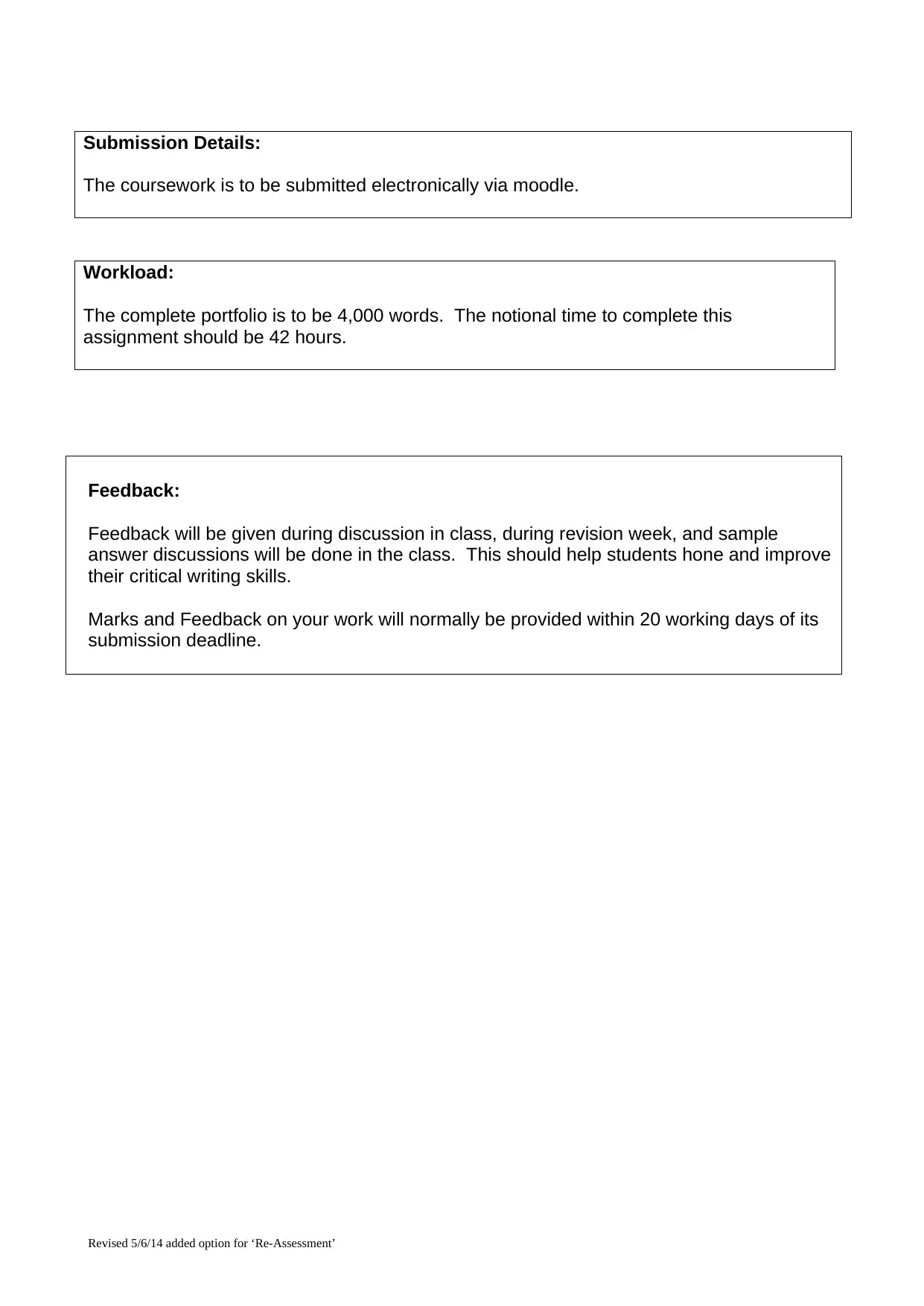
Submission Details:
The coursework is to be submitted electronically via moodle.
Workload:
The complete portfolio is to be 4,000 words. The notional time to complete this
assignment should be 42 hours.
Feedback:
Feedback will be given during discussion in class, during revision week, and sample
answer discussions will be done in the class. This should help students hone and improve
their critical writing skills.
Marks and Feedback on your work will normally be provided within 20 working days of its
submission deadline.
Revised 5/6/14 added option for ‘Re-Assessment’
The coursework is to be submitted electronically via moodle.
Workload:
The complete portfolio is to be 4,000 words. The notional time to complete this
assignment should be 42 hours.
Feedback:
Feedback will be given during discussion in class, during revision week, and sample
answer discussions will be done in the class. This should help students hone and improve
their critical writing skills.
Marks and Feedback on your work will normally be provided within 20 working days of its
submission deadline.
Revised 5/6/14 added option for ‘Re-Assessment’
⊘ This is a preview!⊘
Do you want full access?
Subscribe today to unlock all pages.

Trusted by 1+ million students worldwide
1 out of 6
Related Documents
Your All-in-One AI-Powered Toolkit for Academic Success.
+13062052269
info@desklib.com
Available 24*7 on WhatsApp / Email
![[object Object]](/_next/static/media/star-bottom.7253800d.svg)
Unlock your academic potential
Copyright © 2020–2026 A2Z Services. All Rights Reserved. Developed and managed by ZUCOL.





